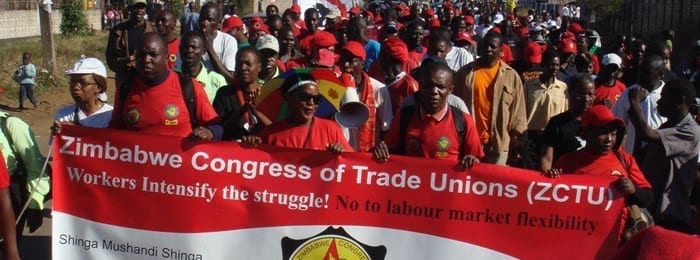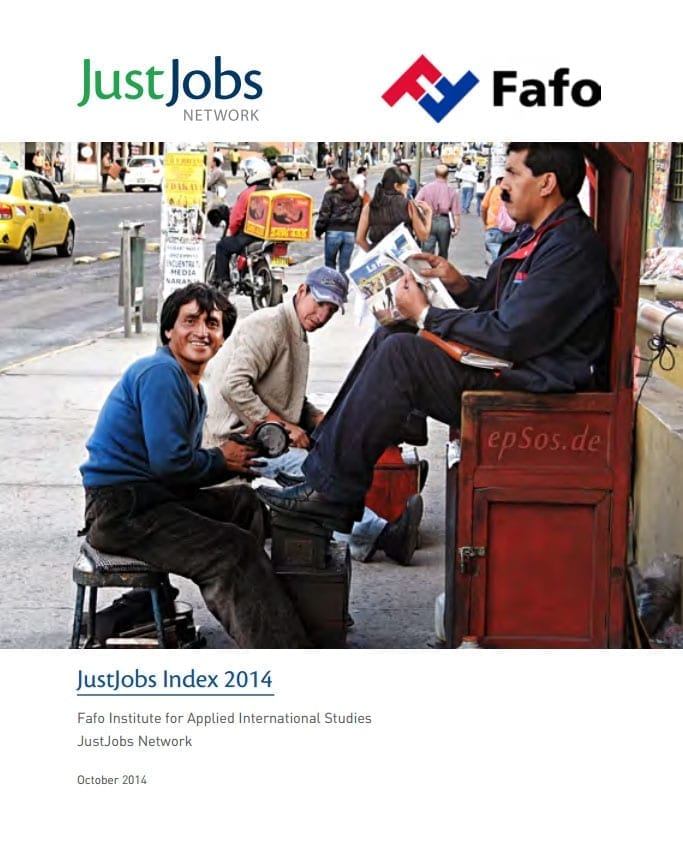
Apr 10, 2015
The Zimbabwe Congress of Trade Unions (ZCTU) will take to the streets in six cities on Saturday to protest economic stagnation and an increasingly repressive environment for workers, civil society activists and human rights defenders.
Over the years, the ZCTU has tracked the steady decline in the country’s economic situation and its widening informal economy—where more than 80 percent of Zimbabweans work for irregular pay or no pay at all. And it has decried the ever-dwindling number of formal jobs: down by nearly 10,000 positions in 2013 and more than 5,000 in 2014, according to its calculations.
As the economy sputters, the government is threatening to cut wages, pushing to gut the country’s labor laws and blaming workers for the country’s terrible economic situation.
The march will take place in an increasingly threatening environment for activists. Last month Itai Dzamara, a leading pro-democracy advocate, was abducted. He remains missing, and leading civil society organizations—including the ZCTU—are calling on the government to ascertain his whereabouts and prosecute his abductors.
Police in the cities of Bulawayo, Mutare and Masvingo initially refused to grant permission for the demonstrations, but reversed their decisions after the Harare police agreed to allow the demonstration there, according to the International Trade Union Confederation (ITUC).
In 2010, an International Labor Organization (ILO) commission found serious government interference in ZCTU meetings and demonstrations in violation of ILO Convention 87 on freedom of association and Convention 98 on collective bargaining. The ITUC notes that while the government pledged to the ILO that police and security forces would receive training and education to prevent such violations in the future, the interference continues.

Oct 20, 2014
A new data-driven online index launched by JustJobs Network, a nonpartisan global policy and research institute, highlights the need for sustainable employment and offers policymakers and other decision-makers worldwide a tool to help generate more and better jobs worldwide.
Created in partnership with Fafo, an independent and multidisciplinary research foundation, the JustJobs Index offers the first-ever index to measure both quantity and quality of jobs. The site includes two indexes with country-by-country data trends between 2000 and 2013. The Global JustJobs Index ranks 148 countries on quantity and quality of employment in 10 areas, such as unemployment and gender equality. The Enhanced JustJobs Index includes 41 countries where more extensive data is available, and offers 17 indicators. The site also provides longitudinal country comparisons, maps and downloadable reports.
The JustJobs Index is anchored in the International Labor Organization (ILO) decent work agenda and Article 7 of the International Covenant on Economic, Social and Cultural Rights recognizing the right of everyone to just and favorable working conditions. An accompanying report details the methodology underlying the data.
More than 200 million workers around the world are jobless, nearly 40 percent of them young workers, and many more—approximately half the global workforce—labor in the informal sector, where they lack basic protections. And even formal sector workers increasingly find their wages stagnant and their benefits stripped away.
JustJobs says the index should “provide a strong empirical basis for policy dialogue and formulations” as more policymakers and leaders around the globe recognize that high inequality is a sign that a country’s labor market is not producing enough good jobs and that work “is fundamental to the well-being of economies.”

Sep 24, 2014
When President Obama spoke yesterday at the 2014 Clinton Global Initiative about the value of civil society and the necessity of developing young civil society leaders, the first person he recognized as contributing to the development of his community was Solidarity Center fellow and Kenya social justice activist Walid Ahmed Ali.
Commending him for his work creating jobs at the Kenya-Somali border for unemployed youth, Obama said Ali told him he “strives not just for the idea of democracy,” but “to cement the practice of democracy.
“We thank you Walid for your extraordinary efforts and we stand with you,” the President said.
Ali has been in the United States for the past four months, where he spent the first six weeks at the University of California-Berkeley on a Mandela Washington Fellowship through the Young African Leaders Initiative. He then won an internship through IREX, enabling him to work for the past two months at the Solidarity Center.
Ali, who founded the Lamu Youth Alliance, offers jobless young workers counseling, business classes and small plots of farm land to support themselves in their communities in and around Lamu.
Just off Kenya’s eastern coast, the Lamu archipelago is an environmental oasis where farmers and fishers maintain the livelihoods that have supported their families for generations. Yet a government initiative to turn the area into a massive transportation hub while bringing in tens of thousands of overseas workers to build and operate it, threatens to displace Lamu residents, wreak havoc with the environment and damage the cultural heritage of Lamu Old Town, a World Heritage site UNESCO describes as “the oldest and best-preserved Swahili settlement in East Africa.”
“The indigenous community was evicted for the project and there was no compensation, no training for other jobs,” Ali says. The Lamu Youth Alliance joined the Save Lamu network, a coalition working to develop a bio-cultural community protocol (BCP) to document community practices, rights over communally managed lands and traditional knowledge.
Ali, 29, returns Saturday to Lamu, where he will continue his efforts to push for job creation, especially for the country’s young workers, the vast majority of whom are not employed in the formal economy. Unemployment in Kenya stands at 40 percent, and 70 percent of people unemployed are young workers between the ages of 15 and 35.
Yet despite the country’s dire need for jobs, Ali says half of the 1.5 million workers who will be employed on the Lamu Port Southern Sudan Ethiopia Transport corridor project (LAPSSET) are expected to come from China. The project, slated to become Kenya’s second largest transportation hub, did not go through a procurement process, Ali says, and the wages for the project’s workers do not meet the country’s minimum wage laws.
“I am not against the project, but I want the project to be done according to protocol,” he says.
Ali, who ran for public office last year in his local ward—coming in second among 12 candidates despite being significantly outspent by the winner—will continue working toward his bachelor’s degree in development at the Technical University of Mombasa in Kenya, where he attends classes at night. During the days, he plans to carry on his work with youth by empowering them with leadership skills, increasing their understanding of sustainable development and promoting their rights with the goal of bringing positive change to Kenya.
“My concern is to promote social rights and justice and also gender equality,” he says. “I want to be a good leader with a very strong potential for assisting my community.”
Aug 8, 2014
 Meeting in Washington, D.C., this week, 40 African trade union leaders highlighted creation of good jobs, social protections and freedom to form unions as essential for Africa’s development. One way to do so is to make the African Growth and Opportunity Act (AGOA) work for working people.
Meeting in Washington, D.C., this week, 40 African trade union leaders highlighted creation of good jobs, social protections and freedom to form unions as essential for Africa’s development. One way to do so is to make the African Growth and Opportunity Act (AGOA) work for working people.
AGOA must have strong labor clauses “to ensure that workers’ rights are protected, they are given decent work,” said Caroline Khamati Mugalla, executive secretary of the East African Trade Union Confederation. Mugalla spoke with RadioLabour.
AGOA, which gives eligible sub-Saharan countries duty-free access to the U.S. market for a variety of products, is up for re-authorization in 2015. In the 15 years AGOA has been in effect, it has increased exports from sub-Saharan Africa, but by focusing mostly on tariff reductions, it has not spurred broader development or fostered a robust and equitable economic system.
Trade agreements must create decent work, Mugalla said, and decent work “is all about social dialogue, strengthening social dialogue to ensure that workers’ rights are actually met.”
African union leaders met as African heads of state took part in the US-Africa Summit August 4-6 in Washington, D.C.
Listen to the full interview.
Find out more about AGOA
Aug 1, 2014
 Nearly 40 trade union leaders from Africa are meeting in Washington, D.C., over coming days for a series of events to highlight the concerns and needs of working people throughout sub-Saharan Africa.
Nearly 40 trade union leaders from Africa are meeting in Washington, D.C., over coming days for a series of events to highlight the concerns and needs of working people throughout sub-Saharan Africa.
The meetings parallel the August 4-6 White House Summit for African heads of state, with union leaders seeking to influence public debate and hold leaders accountable over key issues such as decent jobs, social protections, gender equality and environmental sustainability.
On Monday, Liberian union leaders will take part in the panel “Trade Unions and Democracy from Below,” at the all-day “Empowered Africa” conference at Howard University, which is open to the public. Other events include forums on promoting decent work, inclusive development and a discussion on the Africa Growth and Opportunity Act (AGOA).
As a recent report by the AFL-CIO and Solidarity Center points out, in the 15 years AGOA has been in effect, it has increased exports from sub-Saharan Africa but has not spurred broader development or fostered a robust and equitable economic system.
Naome Chakanya, an economist with the Labor and Economic Development Research Institute of Zimbabwe (LEDRIZ) who will be among trade unionists in Washington, says workers are looking for “trade agreements which do not compromise the government’s ability to adequately provide social services (public goods) which include health, education, water, electricity.”
Trade agreements benefit African workers only if they include worker rights, social protection, employment creation and social dialogue, Chakanya says, listing the four elements that the International Labor Organization (ILO) defines as fundamental to decent work.
AGOA is due for reauthorization in September 2015. Reauthorization represents an opportunity to promote a coherent regional policy that benefits African workers and communities and addresses the challenges of a changing global economy. The White House Summit also includes an AGOA forum with finance and treasury ministers.
Achieving decent work also requires innovative approaches to addressing the informal economy, one of the key points in a new Solidarity Center report. Based on a 2013 survey of trade unionists in nine African countries, the report calls for worker associations and African governments to share experiences and invest more resources to empower workers in the informal economy and extend social protections to informal-sector workers, especially women. National and global economic trends suggest that more and more workers will seek to make a living in the informal economy in the face of fewer permanent, formal-sector jobs.
The report, “African Trade Unions and Africa’s Future: Strategic Choices in a Changing World,” also calls for enforcement of existing international worker rights standards. A broad body of international and national laws and standards protects workers and their rights, but they generally are not enforced, including by countries participating in programs like AGOA. As a result, workers are vulnerable to abuses such as unsafe and unhealthy workplaces, forced labor, lost wages, sexual harassment and workplace violence.
You can follow events throughout the week on Twitter with the hashtags #USAfrica, #AfricaSummit and #WeAreAfrica, and check back here for updates.





